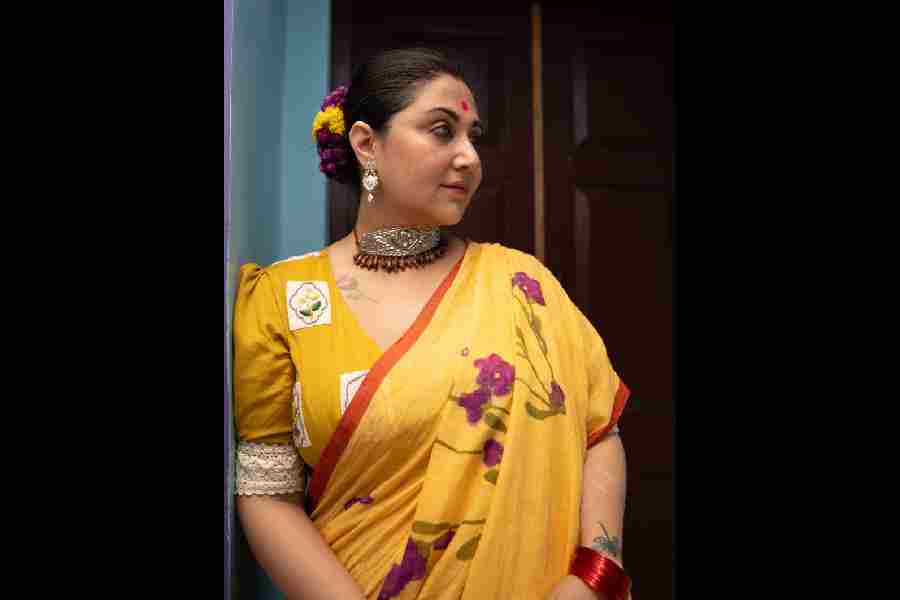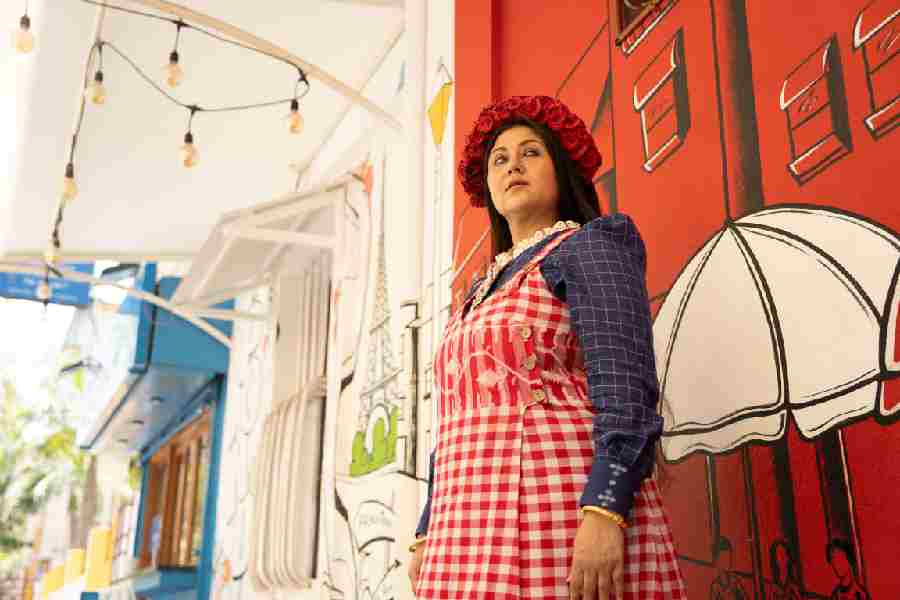There’s a soft clink of glasses and the occasional tinkle of laughter at The New Madam G on Lee Road, the thrum of pop music wrapping around the chatter like a warm, unnoticed embrace. As Swastika Mukherjee walks in, there’s something magnetic about her presence — calm yet electric, unapologetically herself. The fabric of her sari from Anjali Pratyay ripples like the quiet unfolding of a story, equal parts grace and intent. We settle into a corner booth, and the evening flows around us without fanfare, a soft rhythm, like the slow burn of a candle’s light.
The conversation begins easily, as if the words had been waiting to be spoken, tucked away in the space between silence and breath. There’s no script — just truth, memory, and the way Swastika folds each moment into her lines, not loudly, but with the quiet weight of a thought long carried. We couldn’t help but reminisce about the letter-reading session we saw her at recently, the depth of her words still hanging in the air like a lingering note after the final chord.
She doesn’t hesitate. “That ache, the love lost and found, it’s real. Not just romantic, but all kinds of love — sometimes, the space between friendship and romance. But I tap into every form of pain. The things that stay with me, like the stray baby we couldn’t save — those moments linger like ghosts. It’s not just romantic heartbreak. Losing my parents, having my daughter far away — that longing to belong, to be near the ones you love, it’s universal. Those things, they stay with you. They carve themselves into your heart.”
Swastika’s fingers tap lightly against her phone, a soft rhythm that punctuates her words. Her gaze drifts, quiet and reflective, before she recalls the headlines that followed her — the judgements, the casual cruelty. “I once said in an interview that I had six relationships. The reactions were like I’d committed a crime. But if I’d said 6,000, maybe people would have laughed.” Her lips curve in irony, a soft smile playing on the edges of her words. “Men get celebrated for being Casanovas. Women, we get labelled.”
But she doesn’t bristle at the judgment anymore. “There’s no image to protect. I’ve always been this way,” she shrugs, as if shedding a weight only the world insists on carrying. “A friend once said it feels like I’m talking to them from their living room. Maybe that’s it — I’m just myself. My characters change, but I don’t.”
The conversation then shifts towards Durgapur Junction, a film that marks a departure from her usual fare. “This one is different,” Swastika says, her voice steady but filled with a quiet intensity. “People haven’t seen me in this avatar. It’s not that it’s hard on paper. But I’m always complicating things. Adding layers, adding depth. I want to make it intense, make it real. I want the audience to feel the rawness, the essence of the story.”
Her voice becomes even more purposeful, each word a slow, deliberate movement. “It wasn’t easy. We filmed in peak summer in Durgapur and Santiniketan, I was in a wig. Those little discomforts pile up, like pebbles gathering in your shoes. But it’s part of the process. You commit to the work — you do what’s necessary to tell the story. When we say a character is challenging, it is not always just the character but also the surrounding factors while shooting.” She pauses for a moment, her gaze distant, before she adds, “It’s important to me to keep pushing myself. To not settle for just good enough. To create something that feels true.”
When asked about the challenge of playing such a character, she responds with conviction, her eyes alight with a quiet fire, “I don’t want to be static. I don’t want to do the same thing over and over. That’s not enough for me. I want my roles to keep evolving. Like I have recently played several characters who are mothers but the mother in Qala is very different from the mother in Criminal Justice. Durgapur Junction (which releases in theatres on April 25) is a chance to show a different side of myself. And for me, that’s the real challenge.”
There’s a palpable weight to her words as she continues, “It’s not just about performing, it’s about fully inhabiting the character. I want the audience to see the nuances, the moments that feel so human, so raw. I want to be seen, not as a celebrity or a ‘name,’ but as an actor doing something real.”
She speaks of the fatigue of being misunderstood in an age where love becomes just another clickbait headline. “Break-ups turn into controversies. Loving someone becomes a scandal. When did heartbreak become breaking news?” Swastika shakes her head, the bitterness just beneath the surface. “Now, I hide the beautiful things. If they don’t know, they can’t destroy them. That’s the rule now.”
The conversation lightens as she remembers a recent trip to Pondicherry with fashion designer and long-time friend Parama Ghosh. “It was a working holiday. No entourage. I did my own hair and make-up. Changed in cafe bathrooms. Shot on the streets before the crowds came,” she grins. As she went on about how she asked Parama to pack as many outfits as possible and how her best friend from school flew down in an hour to spend time with them, the laughter in her voice was a balm, softening the weight of her words.
Her energy is contagious, her stories full of warmth. “Parama says that I eat batteries. I just don’t stop,” she laughs, a bright spark in her eyes. “We worked hard, then treated ourselves to a spa. It was perfect.” This same boundless energy flows into her work. Amid the chaos, there’s her daughter, Anwesha, now a psychologist in Cardiff. Swastika recalls their time together on the sets of the film Take One where her daughter did not even feel like she was on a set, considering the familiar faces on set. She laughs at how her daughter avoids Calcutta’s heat. “She only visits in winter or we fly to a common destination,” she smiles, the love for her daughter radiating from her.
Her last project with Vikram Chatterjee (her co-star in Durgapur Junction), Saheb Bibi Golam, was bold and raw. “That film was psychotic,” she laughs. “It was probably the boldest mainstream Bengali film. So this time, the chemistry was already there, waiting. It did not feel like years had passed.” Looking ahead, her slate is full — an indie film for Netflix with Devashish Makhija, a Marathi project with a close friend, Bibi Payra with Paoli Dam and Ashani.

Swastika Mukherjee
We ask how she recovers from roles that demand so much emotional intensity. “I don’t need to dig deep anymore. The wounds float. I just reach out and grab one. It’s how I work now. Intense roles in Criminal Justice, Qala — they drain you emotionally. You carry that grief home,” she explains, her tone quiet but heavy with experience. She pauses, a small but significant silence hanging in the air. “I’ve always been a diver, not a floater. My therapist says, ‘Just float, Swastika. You don’t always have to drown.’” Loss, she says, reshapes you. “You want to protect yourself from being hurt. That’s why I’ve unfollowed people on Instagram. Not because of bad vibes, but because of the things they post... I just can’t consume it. I need to protect myself.”
She leans back, a wry smile touching her lips. “It’s about prioritising my well-being over what others expect. I don’t do it for the plot.” What does the world think? She smiles softly, her eyes clear. “It doesn’t matter. What matters is what my close friends think. What my daughter thinks. The buck stops there.” As the conversation winds down, Swastika remains poised, cross-legged, her eyes reflecting both the weight and ease of a journey lived fully. She’s carved out a space where she is simply herself — no masks, just the truth. In her words, her laughter, and her rawness, she’s found that the surface holds all she needs. And for Swastika, that’s enough.
Hair and make-up: Swastika Mukherjee
Styling: Swastika Mukherjee and Parama Ghosh
Outfit: Parama Calcutta










